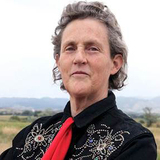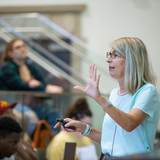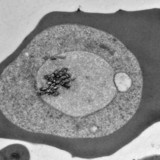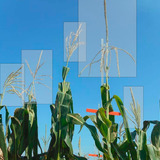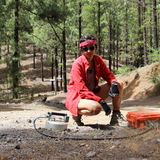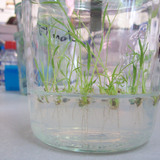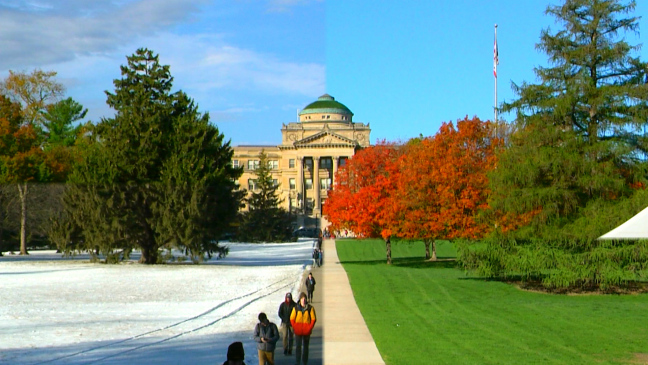News Archive
Saturday, September 1 2018
-
Temple Grandin will discuss autism, animal behavior at Iowa State
Temple Grandin, a renowned expert on animal behavior and activist for people with autism, is coming to Iowa State University on Sept. 13.
-
Link between divorce and graduate education a concern as more jobs require advanced degree
Children of divorce are less likely to earn a four-year or graduate degree, according to new research from Iowa State University. Researchers says it is important to understand this relationship as more jobs require a graduate or professional degree.
-
Change Agent: Cinzia Cervato, improving science education, rebuilding after a stroke
Cinzia Cervato will start the fall semester with an explanation and an invitation to her students -- she wants them to understand why she "flipped" her classroom and wants them to meet with her so they get to know her. It's all part of her work to improve science education. Returning to that work was part of her motivation to recover and rebuild after a stroke.
-
Go behind the scenes of animated favorites with award-winning lighting director
Danielle Feinberg, award-winning lighting director for films such as “Coco” and “Brave,” will deliver a lecture Sept. 6 at Iowa State University discussing how she weaves art and science to create fantastical worlds on the big screen.
-
Iowa State University scientists study how malaria parasites take over human red blood cells
The parasites that cause malaria make themselves at home inside a host’s red blood cells. An Iowa State University scientist has shown in a pair of newly published articles just how that process works. This new understanding could help to identify new ways to treat malaria.
-
Researchers use crowdsourcing to speed up data analysis in corn plants
An interdisciplinary research team at Iowa State University turned to crowdsourcing to help them design a machine-learning algorithm that could speed up the process of breeding new crop varieties with desirable traits. The recently published research focuses on identifying tassels in images of corn plants, but the work could have implications for other crops as well.
-
Predicting, preventing spread of opioid epidemic in rural and micropolitan areas
The rapid increase of opioid overdose deaths in rural communities across the country has far outpaced the overdose rate in urban areas, and an Iowa State University-led research team wants to know why. The researchers’ goal is to identify prevention strategies and use big data to predict which communities may be at risk.
-
Iowa State alumnus returns to tell refugee stories, including his own
An Iowa State University architecture alumnus is returning to campus Sept. 5 to share his story as a Syrian refugee and to discuss his artwork recreating refugees’ stories in suitcases.
-
Former U.S. agriculture secretary and Iowa governor Tom Vilsack will speak at Iowa State
Tom Vilsack is returning to Iowa State University this fall to discuss recent developments in U.S. trade relations and foreign policy and their effect on U.S. agricultural markets and practices.
-
Iowa State sophomore returns from summer on research vessel, atop active volcano
Chanel Vidal, an Iowa State University sophomore in geology, returns to campus after a whirlwind summer working aboard a research vessel in the Atlantic Ocean, studying the Deccan Traps in India and collecting gas samples from an active volcano in the Canary Islands.
-
More women running for political office may hurt chances for down-ballot candidates
Gender stereotypes and biases still influence voters, especially in elections with more than one woman on the ballot. New research from Iowa State University found gender had the greatest effect on down-ballot races, in which women were running for a legislative office and another woman appeared on the ballot for a higher office, such as governor or president.
-
Iowa State University scientist helps to develop rice plants to neutralize HIV transmission
An international research group, which included an ISU scientist, has proven that three proteins that can help prevent the spread of HIV can be expressed in rice plants. Using plants as a production platform could provide a cost-effective means of producing prophylactics, particularly in the developing world.
-
Breaking down the barriers of human-computer communication
Many of us regularly ask our smartphones for directions or to play music without giving much thought to the technology that makes it all possible – we just want a quick, accurate response to our voice commands. With more businesses using artificial intelligence to engage with consumers, the industry is working to make those interactions more human-like. An Iowa State researcher is contributing to that effort by improving how machines, such as smartphones and computers, understand and generate language.
-
Biomedical scientist receives Department of Defense grant to study how metal exposure affects Parkinson’s symptoms
ISU biomedical scientists are examining how exposure to the metals manganese and vanadium may contribute to Parkinson’s disease. The research was supported recently by a nearly $1 million grant from the U.S. Army Medical Research Acquisition Activity.
-
Seismologist works to determine the limit of ground accelerations during earthquakes
Iowa State's Igor Beresnev has worked summers and weekends to find the answer to a very old question in seismology. Yes, he says, there is a limit to ground accelerations during an earthquake.
-
Startup businesses find success, plan for future after CYstarters
CYstarters may have ended, but the work continues for the 15 startup businesses founded by Iowa State University students and recent alumni.
-
Hydration strategy key as high school athletes begin practice
The first week of high school sports practices is a particularly vulnerable time for athletes, says an Iowa State University assistant professor of kinesiology. James Lang studies how environmental stresses, such as heat, affect how our bodies regulate internal temperature. Lang says being proactive about hydration, rather than reactive, is important to keep athletes safe.
